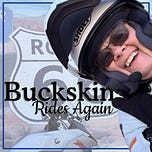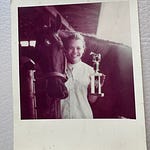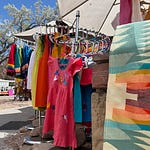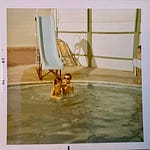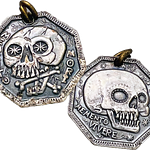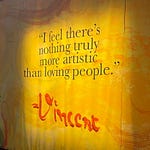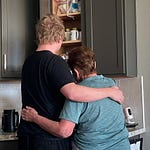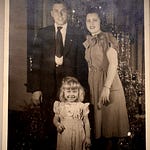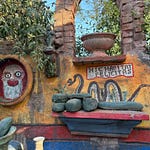I’m in my early sixties, riding into my elderhood with the throttle open and the map unwritten. I’m no longer proving anything, but I’m not done becoming, either.
If I could choose a superpower, I wouldn’t ask for flight or telekinesis—I’d ask for invisibility. Not because I want to disappear, but because I want to witness the world unfiltered. Not the performance people give—or even the subtle shifts in animals when they know they’re being watched—but the quiet reality of what life looks like in its unaltered state.
It started in childhood, when I wanted not just answers, but honesty. Even then, I could sense when I was being handled. Told only part of the truth. And I didn’t like it.
That hunger—for truth raw, unfiltered, unscripted—never left me. I’ve spent a lifetime developing ways to find it.
The Road as Mirror
One of them is road-tripping. Not the casual kind, but the practiced, solo kind—the kind that taught me how to read landscapes, silence, body language, even my own moods. It’s a skill, but it started with instinct.
The road doesn’t angle itself toward my gaze—not like home, where anything can kick sand into the gears of relationships. It doesn’t tidy up or announce its best features. It just is. And when I pay attention, I get to witness moments that feel sacred in their ordinariness: a shift in wind, the smell of unseen water in the desert, a black cat blinking from a window, an old man laughing too hard at his own joke in a gas station parking lot. I call this road magic.
Road magic isn’t luck. It shows up when I leave space in my schedule and spirit. I can’t chase it, and I won’t find it if I’m rushing toward a reservation or obsessing over my m.p.g. It shows up in the small spaces I give myself permission to linger in. And it usually arrives when nothing’s going as planned.
Just another note about invisibility: it doesn’t mean detachment. For me, it means I get to step outside the roles I play at home—wife, mother, daughter, neighbor—and meet the world without the weight of expectation. It’s a rare liberty for anyone, but especially for women. On the road, I get to return to my truest self. The road, in its vast, indifferent kindness, always seems ready to receive me.
People sometimes ask if I get lonely out there. I don’t. Not because I don’t love the people in my life—but because my solitude feels expansive, never empty. Out there, I’m invisible by choice. No one has a stake in who I am or how I’m supposed to behave. But at home, I’m needed—and that kind of visibility carries its own weight.
We have an understanding, Matt and I. The beach is his touchstone—the place where time slows and things feel just as they should. He loves the familiarity of returning to the same spot each summer, the rhythm of days that don’t ask too much when most other days are relentlessly demanding. I go with him because he wants me there, and because I’ve come to love seeing the world through his eyes. That’s reason enough.
My touchstone is the road and all it brings. But family—even when it’s complicated, and isn’t it always?—gives shape to the inner landscape, not just the outer one. My family of origin shaped who I am, but it’s my family of making—my spouse and children—alongside my own choices and hunger for experience—that continues to reshape me. Between the grounding and the wandering, I’ve become someone more whole.
The Call from Home
Around Christmas 2024, my brother JJ called with the news every adult child expects—but not yet. It’s the timing that stings. Mom and Dad’s lives were shifting—physically, and in Mom’s case, cognitively.
I hesitate to use that word—cognitively. She has no diagnosis. Might not for years, maybe never. Although I’ve never gone to a doctor visit with her, I’m sure she’s sharp-eyed and witty there. Probably even pokes fun at the new wrinkles or aches. But something is shifting. Something quiet, like the ground under your tires that doesn’t immediately gain traction the way it used to.
And even here, telling this story, I wonder if I’m trespassing. Then again, if she were recovering from back surgery, I wouldn’t flinch at saying so. I’d tell the world I was headed that way to help her through rehab, and friends would send soup emojis. But memory? Comprehension? Speech that loops or lags? Taboo. This is where some people step back, while others bombard you with to-do lists and recommended dietary supplements.
Is part of this because Americans praise productivity while devaluing everything else? Is it what I’ve heard called personal grief avoidance: if a parent is fading, does that mean I must be next?
I think a big part of the taboo is rooted in privacy—and who among us isn’t afraid of violation on that front? And isn’t it worse if the parent isn’t aware of the slip? Does this mean I’m talking behind her back? Gossipping? Maybe I’m not crossing a line by telling the truth—just laying one down, gently, so the rest of us know where we are.
JJ and I came to the same conclusion quickly: they needed to simplify. Less reliance on temperamental tech. More like-bodied people to socialize with. And a home that didn’t demand so much from Mom’s time and energy.
Even when I was little, I could tell: cleaning was never just about tidiness for Mom. It was about regaining control when the rest of the room—or the world—got out of hand. It isn’t that Dad doesn’t help. It’s that she needs it more.
My brother put a soothing tone in his voice. “Look, Tam, you don’t have to rush right out here. How about coming in the spring before Phoenix boils over?” His offer was a grace in my work calendar and for my soul, which needed some time to adjust.
Distance Designed for Breathing
I left home when I was twenty and have loved my parents from a distance of several states ever since. Not a hostile distance—just the kind that allowed me to breathe. The kind that suited someone wired to seek possibility, who believes—almost reflexively—that something better must be “out there.”
Mom and I have never quite found our rhythm. And I know I’m not alone in this. It might be generational. Women of my age—Generation Jones, they call us—weren’t raised to consider our mothers as best friends. I don’t know a single woman my age who says that. But I know plenty who say it about their daughters.
The space between mothers and daughters is often complicated. We inherit more than habits—we inherit expectations, myths, and wounds we didn’t cause. Some of that space isn’t personal; it’s cultural.
But it still lands in personal places.
Because she’s my mother, I wanted to reach out as an adult and be a soothing presence as she walks this uncertain path. Whether it would register with her on a conscious or subconscious level didn’t matter. It was time to do what was needed—not because it was comfortable or familiar, but because it was the loving thing to do.
I pulled out my calendar and decided on April. By then, my client’s book would be in the publisher’s hands, and I could finally head west to be there with my parents for as long as it took. I’d be stepping into a new role, a more active one, within our family—and this called for a week or ten days of uninterrupted time on the road. Not behind a windshield, or from 30,000 feet in the air, but behind handlebars. Slow travel, the kind that starts and ends under a motorcycle helmet, where I smell the changes in the air, the subtle temperature and humidity shifts, and get a close-up look at what’s rotting at the edge of the tarmac.
Buckskin, Then and Now
Before I snapped the touring cases onto the bike and charted a route, I remembered where this pull westward always starts for me. The desert is in my blood. Is that why I keep finding my way back?
For the first years of my life, Barstow, California, was my home: the place where I cradled horned toads in my tiny palm, their spiked heads turning and tilting inquisitively to look into my eyes, unafraid.
Although we moved from the Mojave Desert to Ohio when I was five, the desert left its mark, wiring me for vast, open spaces. Most summers, we drove cross-country in the Vista Cruiser to visit family in California. With every mile, the landscape unfolded—flat plains giving way to the sunbaked vastness I knew in my bones. The desert doesn’t erase; it preserves. Bones, ruins, regrets. You can drive for hours and still be followed by what you thought you left behind.
My dad had mounted a CB radio under the dash—standard issue for long-haul truckers and cross-country dreamers in the 1970s. I was a horsey girl, riding a black pony as a toddler, so when it came time to choose a CB handle, I knew right away: Buckskin. It’s a horse color I’ve always loved—golden coat with black mane, tail, and legs. Slightly rare, always majestic.
He taught me how to scan the channels and call out to fellow travelers in my tinny voice. “Breaker 1-9, this is Buckskin. Got your ears on?”
It wasn’t just play. It was my first real taste of freedom—talking to the wide world out there on nearly equal footing. Those burly truckers on the other end didn’t know my age or name. And really, where else would it be considered appropriate for a grown man to chat with an adolescent girl about speed traps and road debris? All they heard was someone sharp-eyed and road-savvy, part of a bigger world humming with code, caution, and curiosity—while I got a taste of adulthood without its dangers.
Now, I’m riding into my elderhood. Buckskin rides again, in spirit. Wild, unbroken, always galloping beside the station wagon like she was born to outrun the ordinary.
Heading west always feels like opening a door—the air changes, the hours loosen, the sun rides higher in the sky. Westward is where expansion lives. But equilibrium demands both: every period of expansion requires compression. That reckoning would come when I turned east again. I didn’t know what it would ask of me yet. But the road would give me that time, too.
I work as a collaborating editor, mostly on nonfiction—memoirs in particular. It’s a mix of ghostwriting, coaching, and shaping the client’s story until it rings true. Over time, I’ve become a quiet witness to hundreds of reckonings: with family, with culture, with myself. Maybe that’s why I finally set out to write my own.
Where We’re Headed
Sunday mornings just got more adventurous
Each week, I’ll roll into your inbox and podcast feed with stories from a cross-country motorcycle journey—25 dispatches woven with memory, landscape, and the unexpected clarity of the open road. It’s cheaper than gas, and you don’t have to wear motorcycle boots.
Subscribe now and ride shotgun all the way home.

